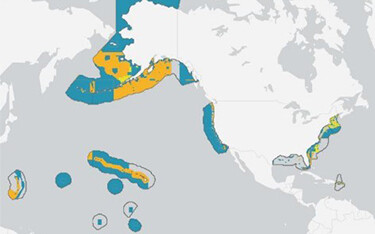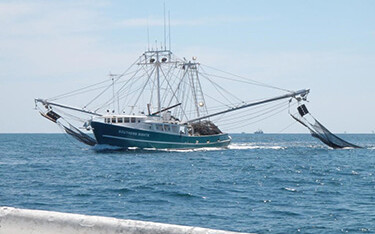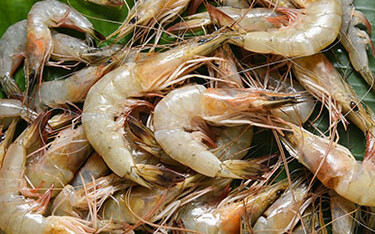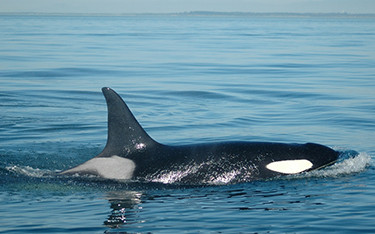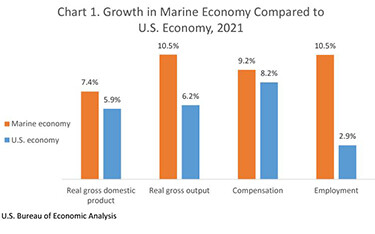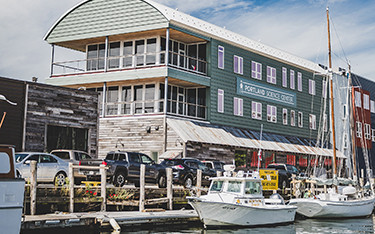Nathan Strout is a Portland, Maine-based associate editor of SeafoodSource. Previously, Nathan covered the U.S. military’s space activities and emerging technologies at C4ISRNET and Defense News, where he won awards for his reporting on the U.S. Space Force’s missile warning capabilities. Nathan got his start in journalism writing about several communities in Midcoast Maine for a local daily paper, The Times Record.
Author Archive
The U.S. Department of Agriculture (USDA) plans to buy a massive amount of salmon, pollock, and other seafood products for the National School Lunch Program and other federal food assistance programs, per two solicitations it released this week.
The USDA's first solicitation asks companies to bid on a total of 47,120 cases of canned pink salmon and 957,920 pounds of frozen Alaska pollock. The deadline for bids is 22 June, with contracts
… Read MoreA nonprofit civil rights group representing Atlantic herring fishermen wants to take its case to the U.S. Supreme Court as part of a growing movement to limit NOAA Fisheries’ rulemaking authority.
In 2020, NOAA Fisheries implemented a new rule requiring fishermen to pay for human at-sea monitors aboard their vessels. While the agency claimed the monitors are necessary to ensure compliance, fishermen balked at the cost, which they claim can
… Read MoreA first-of-its-kind report by the U.S. Fishery Management Council has found 72 percent of federal waters could be classified as conservation areas.
The report is one component of U.S. President Joe Biden's “30 by 30” plan, a federal initiative to commit 30 percent of U.S. lands and oceans to conservation by 2030. Conservation areas identified in the report will be included in the American Conservation and Stewardship Atlas, which
… Read MoreThe Gulf of Mexico dead zone – a hypoxic area with low oxygen levels that are deadly to fish – is predicted to be smaller than average this summer.
The annual dead zone covers about 5,364 square miles on average, but NOAA has forecasted that the area will be 23 percent smaller this year, covering just 4,155 square miles. The dead zone has occurred every summer for the last six years, caused primarily by excess nutrient pollution from
… Read MoreU.S. Customs and Border Protection plans to redistribute USD 2,598,890 (EUR 2,417,871) collected from antidumping and countervailing duties on imported seafood products to domestic producers in the 2023 fiscal year.
The vast majority of the collected funds came from crawfish tail meat imported from China, which accounted for USD 2.3 million (EUR 2.1 million). Vietnamese frozen fish fillets were the other major contributor, accounting for USD
… Read MoreAfter successfully closing the chinook salmon trolling fishery in the southeast of the U.S. state of Alaska with a lawsuit, the Wild Fish Conservancy plans to petition the federal government to protect the region's chinook salmon habitat under the Endangered Species Act.
According to a 24 May letter sent by WFC to Alaska Department of Fish and Game Commissioner Doug Vincent-Lang, the group plans to file a petition seeking protection for chinook
… Read MoreThe U.S. marine economy had an economic impact of USD 432 billion (EUR 402 billion) in 2021, making up nearly two percent of the country's gross domestic product.
The annual Marine Economy Satellite Account, a joint publication of NOAA and the Bureau of Economic Analysis, shows the marine economy bouncing back strongly from the Covid-19 pandemic, outpacing overall U.S. economic growth with 7.4 percent growth in GDP and 10.5 percent growth in
… Read MoreA group of U.S. lawmakers want to establish ocean innovations clusters to help foster economic growth in the blue economy.
The ocean clusters will provide a space for public, private, and academic organizations in a set geographic area to collaborate in promoting economic growth and sustainability, according to U.S. Sen. Lisa Murkowski (R-Alaska), who introduced the legislation alongside U.S. Sen. Maria Cantwell (D-Washington).
“It really
… Read MoreThe U.S. Food and Drug Administration (FDA) wants a better understanding of the mercury levels in seafood products available to American consumers, and it’s conduct an extensive survey to gather that data.
The agency is looking for a contractor to execute the survey on behalf of its Center for Food Safety and Applied Nutrition, testing approximately 600 seafood products for mercury and methyl mercury, according to a 7 June notice.
Products
… Read MoreThe administration of U.S. President Joe Biden announced a framework for distributing USD 2.6 billion (EUR 2.4 billion) in funding for coastal resilience and fisheries support made available through the Inflation Reduction Act (IRA).
The money will go toward fisheries conservation, Tribal priorities, and a new competitive grant program to develop regional approaches to climate resilience.
“Under President Biden’s leadership, we are
… Read More








